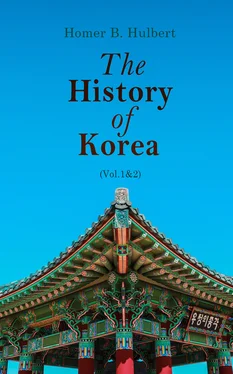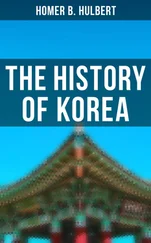On they came toward the capital without meeting anything but a few skirmishers, until they reached the Sal-su, a stream only thirty li from P’yŭng-yang. Crossing this the Chinese went into camp for a few days to recover from the fatigue of the rapid march before attacking the town.
At this point Gen. Eul-ji began operations. He wrote a very humble letter sueingsueing for mercy. When the Chinese general received this, his course of reasoning must have been something as follows: “My forces are completely exhausted by this long march; the provisions are almost gone; I shall find the capital defended by desperate men; it may be that I shall be handled as roughly as were the forces of Gen. Nă. I will accept this submission and start back in time to reach the Yalu before my provisions are entirely gone. I will thus spare my army and gain the desired end as well.”
Whether this was his course of reasoning or not, sure it is that he accepted the submission tendered him and put his army in motion toward the Yalu. But before his forces had gone a mile they found themselves attacked on all sides at once by an unseen foe which seemed to fill the forests on either side the road. When half the army had gotten across the Sal-su the other half was fiercely attacked and cut to pieces or driven like dumb cattle over the face of the country, where they were butchered at leisure. The retreat became a flight, the flight a rout, and still the Ko-gu-ryŭ soldiers hung on their flanks like wolves and dragged them down by scores and hundreds. It is said that in a single day and night the fugitive Chinese covered four hundredhundred and fifty li , and when the remnant of that noble army of 305,000 men that had swept across the Yalu went back across that historic stream it was just 2700 strong. Over 300,000 men had perished along the hill-sides and among the forests of Ko-gu-ryŭ. The Emperor in anger imprisoned the over-confident Gen. U Chung-mun.
Meanwhile what of Păk-je? She had promised that she would rise and strike Ko-gu-ryŭ simultaneously with the Emperor, but when the moment for action came, like the paltroonpaltroon that she was, she waited to see which side would be most likely to win in the end. When the Chinese fled back to the border in panic Păk-je quietly stacked her arms and said nothing about attacking her neighbor.
Winter was now at hand, or would be before another plan could be perfected and carried out. The army was without provisions. There was nothing left but to retreat. The Chinese army, still a mighty host, moved slowly back across the Liao River and Ko-gu-ryŭ was left to her own pleasant musings. All that China gained was that portion of Ko-gu-ryŭ lying west of the Liao River, which the Emperor erected into three prefectures.
If Ko-gu-ryŭ flattered herself that her troubles were all over she was wofully mistaken. With the opening of spring the Emperor’s determination to humble her was as strong as ever. All the courtiers urged him to give over the attempt. They had seen enough of Ko-gu-ryŭ. The Emperor, however, was firm in his determination, and in the fourth moon another army was launched against the hardy little kingdom to the east. It crossed the Liao without opposition but when it arrived at Tong-whang Fortress, near the present Eui-ju, it attempted in vain to take it. The Emperor decided therefore to make a thorough conquest of all the Liao-tung territory and delimit the possessions of Ko-gu-ryŭ as far as the Yalu River, To this end siege was laid to the Fortress of Liao-tung. After twenty days the town was still intact and the Chinese seemingly as far from victory as ever. Ladders were tried but without effect. A bank of earth was thrown upup as high as the wall of the town, but this too failed. Platforms of timber were erected and rolled up to the wall on trucks of eight wheels each. This seemed to promise success but just as the attempt was to be made fortune favored Ko-gu-ryŭ, for news came to the Chinese that an insurrection had arisen in China, headed by Yang Hyŭn-gam. The tents were hastily struck and the army by forced marches moved rapidly back towards China. At first the Ko-gu-ryŭ forces thought this was a mere feint but when the truth was known they rushed in pursuit and succeeded in putting several thousands of the Chinese braves hors de combat .
The following year the Emperor wanted to return to the charge but an envoy came from Ko-gu-ryŭ offering the king’s humble submission. To this the Emperor replied “Then let him come in person and present it.” This he would not do.
Four years later the king of Ko-gu-ryŭ died and his brother Kön-mu assumed control. It was in this same year 618 that the great T’ang dynasty was founded on the ruins of the Sui and the fear of vengeance was lifted from Ko-gu-ryŭ. She immediately sent an envoy to the T’ang court offering her allegiance. Păk-je and Sil-la were only a year behind her in paying their respects to the new Emperor. As a test of Ko-gu-ryŭ sincerity, Emperor Kao-tsu demanded that she send back the captives taken during the late war. As the price of peace Ko-gu-ryŭ complied and sent back 10,000 men. The next year the T’ang Emperor conferred the title of royalty upon all the three kings of the peninsula which, instead of settling the deadly feud between them, simply opened a new and final scene of the fratricidal struggle. To Ko-gu-ryŭ the Emperor sent books on the Shinto faith, of the introduction of which into Korea we here have the first intimation.
Now that danger from the west no longer threatened Ko-gu-ryŭ, she turned to her neighbors and began to exercise her arms upon them. Păk-je also attacked Sil-la fiercely and soon a triangular war was being waged in the peninsula which promised to be a war of extermination unless China should interfere. Of course each wished the Emperor to interfere in her behalf and each plied the throne of China with recriminations of the others and with justifications of herself until the Emperor was wholly at a loss to decide between them. Perhaps it was not his policy to put an end to the war but let it rage until the whole peninsula was exhausted, when it would become an easy prey to his arms. At any rate he gave encouragement to none of them but simply told them to stop fighting. Ko-gu-ryŭ diplomatically added to her supplications a request for Buddhist, Taoist and Shinto teachers.
The details of this series of hostilities between the three Korean states form a tangled skein. First one border fort was taken and then recovered, then the same was repeated at another point; and so it went all along the line, now one being victorious and now another. Large forces were not employed at any one time or place, but it was a skirmish fire all along the border, burning up brightly first at one spot and then at another. One remarkable statement in the records, to the effect that Ko-gu-ryŭ began the building of a wall straight across the peninsula from Eui-ju to the Japan Sea to keep out the people of the northern tribes, seems almost incredible. If true it is another testimony to the great power of Ko-gu-ryŭ. It is said the work was finished in sixteen years.
In 632, after a reign of fifty years, King Chim-p’yŭng died without male issue but his daughter Tong-man, a woman of strong personality, ascended the throne of Sil-la, being the first of her sex that ever sat on a Korean throne.
Many stories are told of her precocity. Once when she was a mere child her father had received from the Emperor a picture of the mok-tan flower together with some seeds of the same. She immediately remarked that the flowers would have no perfume. When asked why she thought so she replied “Because there is no butterfly on them in the picture.” While not a valid argument, it showed a power of observation very uncommon in a child. This proved to be true, for when the seeds sprouted and grew the blossoms had no fragrance. The Emperor conferred upon her the title of royalty, the same as upon a male sovereign.
Читать дальше












